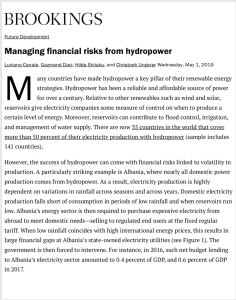Join getAbstract to access the summary!

Join getAbstract to access the summary!
Luciano Canale, Gazmend Daci, Hilda Shijaku and Christoph Ungerer
Managing Financial Risks from Hydropower
Brookings Institution, 2019
What's inside?
Is hydropower an efficient energy solution, or is it just a case of “when it rains, it pours”?
Recommendation
Hydropower is affordable and environmentally friendly, but it has one major drawback – its reliance on rainfall. In periods of low water supply, hydropower producers have to import energy, at some cost, and governments often must intervene. Energy economists Luciano Canale, Gazmend Daci, Hilda Shijaku and Christoph Ungerer of the World Bank discuss ways of making hydropower more reliable and cost-efficient. Anyone interested in financing alternative energy sources will find this report illuminating.
Summary
About the Authors
Luciano Canale et al. are energy specialists and economists at the World Bank.

















Comment on this summary